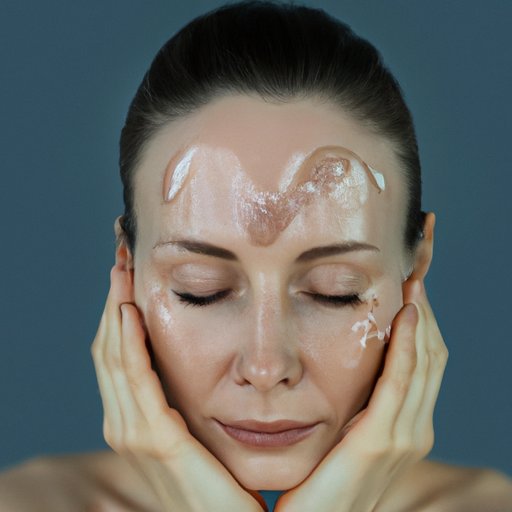Introduction
Dark spots on the face, also known as hyperpigmentation, can be a common and frustrating issue for many people. They typically appear as small or large patches and can result from various causes such as sun exposure, hormonal changes, and aging. The good news is that there are many ways to reduce and even eliminate dark spots on the face. This article will provide a comprehensive guide to these methods, including natural remedies, skincare routines, professional treatments, sun protection, diet and hydration, and mind and body practices.
Home Remedies
Natural remedies are a popular and affordable option for getting rid of dark spots on the face. Lemon juice, for instance, contains vitamin C that can help lighten the skin, while aloe vera has anti-inflammatory properties that can reduce redness and irritation. Apple cider vinegar is an acidic solution that can exfoliate the skin and honey is a natural humectant that moisturizes and soothes the skin. Finally, turmeric contains curcumin which has been shown to have anti-inflammatory and antioxidant effects.
To use these remedies, mix one or two tablespoons of the ingredient with water or other ingredients to create a paste. Apply the paste to the affected area and leave it on for 10-15 minutes before rinsing it off with warm water. Repeat this process two to three times per week until you see results.
Skincare Routine
Having a consistent skincare routine can help prevent and reduce dark spots on the face. Start by cleansing your face with a gentle product that won’t strip the skin of its natural oils. Then, exfoliate with a scrub or a chemical exfoliant that contains alpha or beta hydroxy acids. These ingredients can help remove dead skin cells that can contribute to dark spots.
Next, use a serum that contains vitamin C or niacinamide, which can inhibit the production of excess melanin that causes dark spots. Finally, moisturize your skin with a lightweight product that won’t clog your pores. Apply sunscreen with at least SPF 30 daily to prevent further sun damage.
Professional Treatments
If at-home remedies are not effective, you can seek professional treatments to get rid of your dark spots. Laser therapy, for instance, uses focused light to destroy the melanin-producing cells in the affected area, while chemical peels use acid to remove the top layer of the skin and encourage new cell growth. Microdermabrasion involves the use of tiny crystals to remove dead skin cells and improve skin texture.
While these treatments can be effective, they can also be expensive and come with risks such as scarring or burns. It’s important to consult with a dermatologist before undergoing any professional treatment to determine if it’s right for you.
Sun Protection
Sun protection is crucial in preventing further dark spots from forming. This means wearing sunscreen with at least SPF 30 and reapplying it every two hours when outside. Additionally, you can wear hats or clothing that covers your skin when outdoors and avoid the sun during peak hours.
Look for broad-spectrum sunscreens that protect against both UVA and UVB rays. Zinc oxide and titanium oxide are physical sunscreens that provide excellent sun protection without irritating the skin.
Diet and Hydration
A balanced diet and adequate hydration can promote healthy skin and reduce dark spots. This means eating a diet rich in antioxidant-rich fruits and vegetables, whole grains, and lean protein. Drinking plenty of water can also help flush out toxins and keep the skin hydrated.
On the other hand, certain foods can exacerbate dark spots. For instance, consuming high amounts of sugar or processed foods can cause inflammation and lead to hyperpigmentation. Try to limit your intake of these foods and aim for a nutrient-dense diet.
Mind and Body
Reducing stress and getting enough sleep can also improve skin health and reduce dark spots. Stress increases the production of cortisol, which can lead to inflammation and cause hyperpigmentation. Practicing stress reduction techniques such as meditation or yoga can help lower cortisol levels and improve skin health.
Getting adequate sleep is also crucial for skin health. Aim for seven to eight hours of sleep per night and establish a bedtime routine that helps you wind down before bed. This can include reading a book or taking a warm bath.
Conclusion
In conclusion, getting rid of dark spots on the face can be achieved through a combination of natural and professional remedies, sun protection, diet and hydration, and mind and body practices. Experiment with different methods to find what works best for your skin type and the severity of your dark spots. Remember to be patient and consistent in your efforts and enjoy the benefits of achieving healthy, glowing skin.
